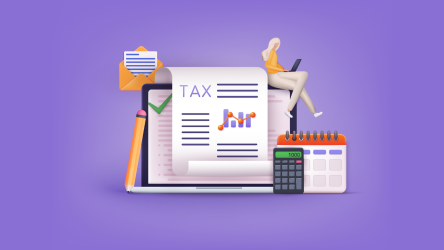
Starting a business is an exciting venture for aspiring entrepreneurs, and it is important that you become well-versed in all things tax.
Keeping up with changes in tax laws and regulations, as well as adhering to proper tax planning and compliance, is essential for the success of any business.
Failure to stay informed on new taxes, reporting requirements and payment obligations can have a significant impact on the viability of your business.
Below are five types of taxes that we suggest small businesses should be well-informed about.
Corporation Tax
As a business owner in the UK, one of the first taxes you need to be familiar with is Corporation Tax.
If your business will be operating as a limited company, you will be obligated to pay Corporation Tax on its earnings, including those generated from trading activities and the disposal of assets or investments.
The current Corporation Tax rate is dependent on the amount of profits generated.
The small profits rate is set at 19 per cent and applies to companies with profits of £50,000 or less.
Companies with profits between £50,000 and £250,000 will pay tax at the main rate of 25 per cent, reduced by a marginal relief. This will help reduce the effective rate of tax that they pay.
Unincorporated businesses, such as sole traders and partnerships, are not required to pay this type of tax.
Value-Added Tax (VAT)
VAT is a consumption tax that is added to the price of goods and services.
If your business has a taxable turnover of more than £85,000 in a 12-month period, you will need to register for VAT with HM Revenue & Customs (HMRC).
Businesses also have the option to choose to register for VAT if their turnover is less than £85,000. This may allow you to recover some of the VAT costs you incur.
Once registered, you will be required to charge VAT on the goods and services you provide and submit quarterly VAT returns to HMRC.
There are three main VAT rates: the standard rate (20 per cent), the reduced rate (5 per cent) and the zero rate (0 per cent).
Some goods and services, such as education, financial and health services, are exempt from VAT.
It is essential to understand which VAT rates will apply to your business, as this will determine how much VAT you need to charge your customers and pay to HMRC.
National Insurance Contributions (NICs)
NICs are payments made by both employers and employees to fund state benefits, such as the state pension.
As a business owner, you will be responsible for paying the employer’s NICs for your employees and your own NICs if you are an employee of your company.
The amount of NICs you pay depends on several factors, including your employees’ earnings and your own salary (if applicable).
There are four main classes of NICs:
- Class 1 – For employees earning above a certain threshold.
- Class 2 – For self-employed individuals with low profits.
- Class 3 – Voluntary contributions.
- Class 4 – For self-employed individuals with higher profits.
Business Rates
Business rates are a form of property tax levied on non-domestic properties, such as shops, offices and factories.
The amount of business rates you pay depends on the property’s ‘rateable value’, which is an estimate of its open market rental value on a specific date.
If your business operates from home or has a low rateable value, you may be eligible for business rates relief. Make sure to check with your local council to see if any reliefs or exemptions apply to your business.
Payroll Taxes
If you employ staff, you will need to set up a payroll system to manage their salaries, tax deductions and NICs.
As an employer, you will be responsible for deducting Income Tax and employee NICs from your employees’ wages and paying these amounts to the HMRC. This is done through the Pay As You Earn (PAYE) system.
To set up a payroll system, you will need to register as an employer with the HMRC, provide your employees with payslips and report your payroll information to the HMRC on a regular basis.
Ensuring compliance with payroll taxes is essential to avoid penalties and maintain positive relationships with your employees.
Understanding the different taxes that apply to businesses is essential to ensure compliance and prevent any unwanted surprises down the line.
By familiarising yourself with Corporation Tax, VAT, NICs, business rates and payroll taxes, you will be well-equipped for navigating your business’s tax obligations.
Remember to consult a professional accountant if you are unsure about any aspect of your tax obligations, as they can provide tailored advice and support for your specific situation.
If you need any advice on taxes for your business, get in touch today.

